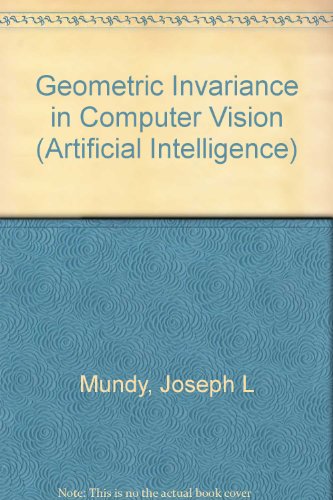
Synopsis
These twenty-three contributions focus on the most recent developments in the rapidly evolving field of geometric invariants and their application to computer vision.
The introduction summarizes the basics of invariant theory, discusses how invariants are related to problems in computer vision, and looks at the future possibilities, particularly the notion that invariant analysis might provide a solution to the elusive problem of recognizing general curved 3D objects from an arbitrary viewpoint.
The remaining chapters consist of original papers that present important developments as well as tutorial articles that provide useful background material. These chapters are grouped into categories covering algebraic invariants, nonalgebraic invariants, invariants of multiple views, and applications. An appendix provides an extensive introduction to projective geometry and its applications to basic problems in computer vision.
Joseph Mundy is a Coolidge Fellow at GE Corporate Research & Development. Andrew Zisserman is a Research Fellow in the Robotics Research Group at Oxford University.
"synopsis" may belong to another edition of this title.
About the Author
Joseph L. Mundy is a Professor of Engineering at Brown University.
Andrew Zisserman is a Science and Engineering Research Council (SERC) Research Fellow in the Department of Computer Science at the University of Edinburgh.
Daniel G. Bobrow is a Research Fellow in the Intelligent Systems Laboratory, Xerox Palo Alto Research Center, editor-in-chief of the Journal of Artificial Intelligence, and Chair of the Governing Board of the Cognitive Science Society.
Michael Brady is Senior Research Scientist at MIT's Artifical Intelligence Laboratory.
Patrick H. Winston is Professor of Electrical Engineering and Computer Science and Director of the Artificial Intelligence Laboratory at MIT.
"About this title" may belong to another edition of this title.
Search results for Geometric Invariance in Computer Vision (Artificial...
Geometric Invariance in Computer Vision (Artificial Intelligence)
Seller: ThriftBooks-Atlanta, AUSTELL, GA, U.S.A.
Hardcover. Condition: Very Good. No Jacket. May have limited writing in cover pages. Pages are unmarked. ~ ThriftBooks: Read More, Spend Less 2.35. Seller Inventory # G0262132850I4N00
Geometric Invariance in Computer Vision.
Seller: Kloof Booksellers & Scientia Verlag, Amsterdam, Netherlands
Condition: as new. Cambridge, MA: The MIT Press, 1992. Hardcover. Dustjacket. 560 pp.(Artificial Intelligence). - These twenty-three contributions focus on the most recent developments in the rapidly evolving field of geometric invariants and their application to computer vision.The introduction summarizes the basics of invariant theory, discusses how invariants are related to problems in computer vision, and looks at the future possibilities, particularly the notion that invariant analysis might provide a solution to the elusive problem of recognizing general curved 3D objects from an arbitrary viewpoint.The remaining chapters consist of original papers that present important developments as well as tutorial articles that provide useful background material. These chapters are grouped into categories covering algebraic invariants, nonalgebraic invariants, invariants of multiple views, and applications. An appendix provides an extensive introduction to projective geometry and its applications to basic problems in computer vision. English text. Condition : as new. Condition : as new copy. ISBN 9780262132855. Keywords : , Seller Inventory # 263350
Buy Used
Ships from Netherlands to U.S.A.
Quantity: 1 available
Geometric Invariance in Computer Vision (Artificial Intelligence)
Seller: Mispah books, Redhill, SURRE, United Kingdom
hardcover. Condition: Very Good. Very Good. Dust Jacket may NOT BE INCLUDED.CDs may be missing. SHIPS FROM MULTIPLE LOCATIONS. book. Seller Inventory # ERICA82902621328503
Buy Used
Ships from United Kingdom to U.S.A.
Quantity: 1 available

